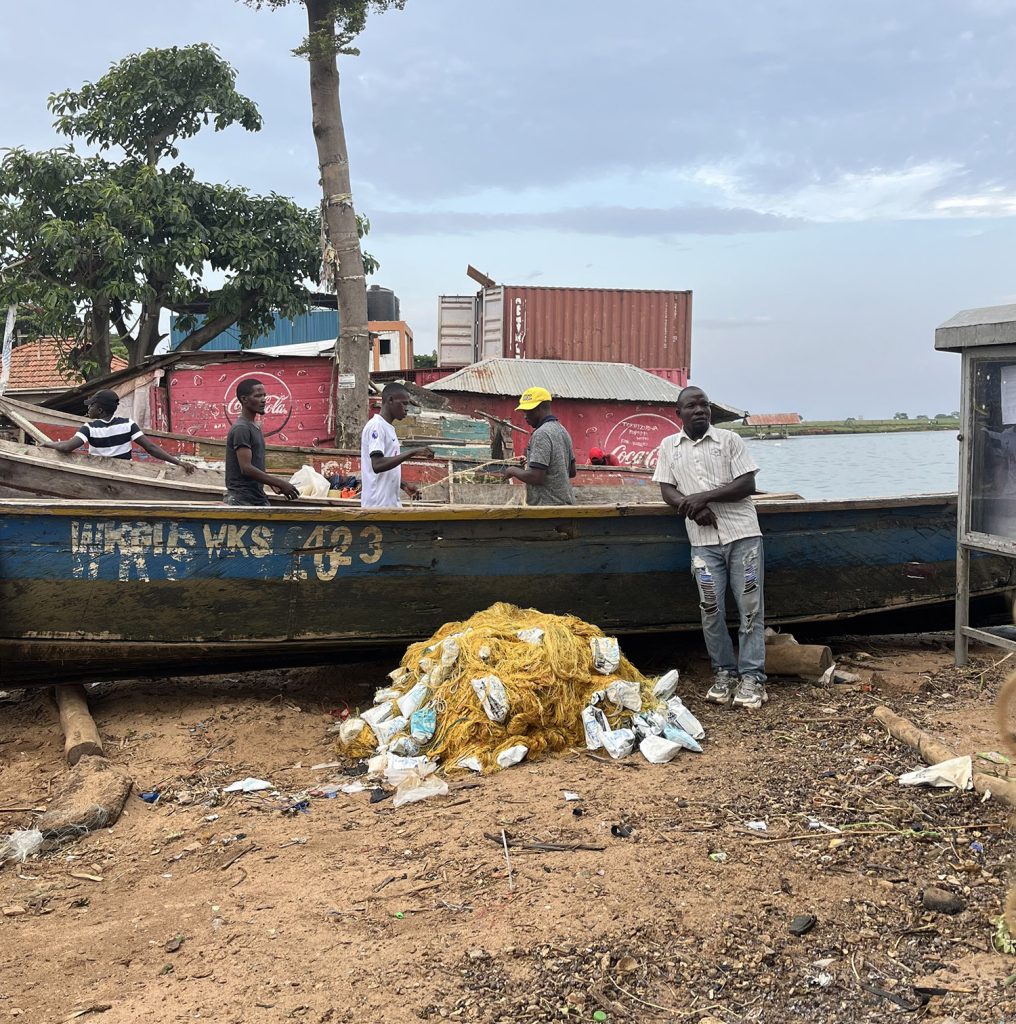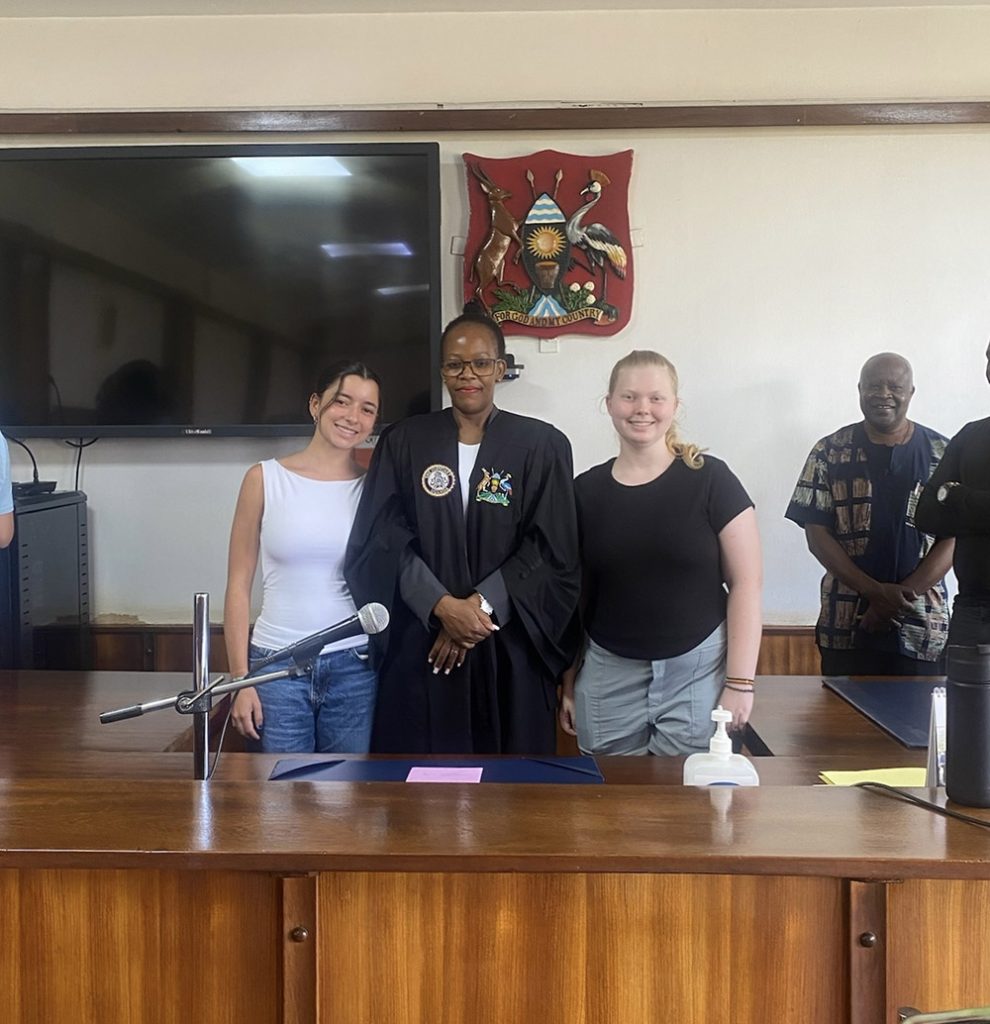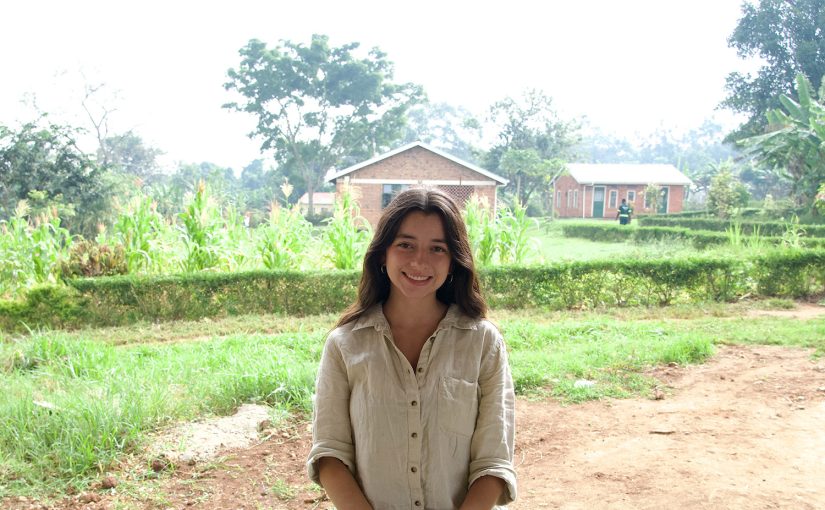By Carolina López
“Mzungu, mzungu,” voices whispered as we walked deeper into the fishing community in a Ugandan village. The word meant “foreigner.” The locals were repeating this word in their native language to point out my travel group entering their sacred space.
We stood at the Kigungu fish landing site, and all I could do was observe. I was taken aback by the fast-paced commerce, hunger, laughter, desperation, hospitality, fear and hope. While chaotically contradicting each other, these aspects made the community stunningly functional. At the fishing site, we had our first real exposure to the interactions among the local people.
Seven students, including myself, had just arrived in Uganda and would remain there for three weeks for Professor Emmanuel Katongole’s study abroad enrichment course: Religion, Peace, and Development.
It was hard for us to overlook the vast body of water surrounding the community: Lake Victoria, Africa’s largest lake and the world’s second-largest freshwater lake. At first glance, I saw the lake for its aesthetic appeal. Its tranquil surface and dark blue tint stimulated my pupils. Yet it did not take long for me to start noticing deeper truths within that body of slowly moving water.
In both symbolic and literal ways, Lake Victoria kept the community alive by providing numerous sources of income. I quickly grew interested in the economic processes and human exchanges I was detecting. As the sun’s intensity gradually abated, the men prepared to set out on their fishing boats while the women stayed to watch over their energetic offspring.
“Fishing is a night business,” a fisherman explained to us. Fortunately, a local resident had agreed to speak with us, and Professor Katongole translated the native Luganda language into English for us. He explained that fish tend to reveal themselves more at night, so fishermen fish during the night and return in the crisp morning air. For them, a good day meant catching around 30 fish, while a bad day entailed a five-to-10 unit catch or no fish whatsoever. Degrading environmental conditions have led to more bad days than good days in the business, the fisherman said. This recent low number of catches was supported by the rising water levels, overpopulation, and visible plastic pollution by the shoreline. Overall, fish populations were declining, and the wildlife was becoming increasingly endangered while the fishermen’s families grew hungrier.

A sense of the shared feeling of desperation from the community sank in. Fishing became a lens through which I could analyze the economic realities in Ugandan communities. The fishing industry accounted for nearly 1.5% of the country’s gross domestic product, but after meeting with the fisherman, I wondered how these individuals made ends meet.
Altogether, about 700 small boats comprised the Kigungu site. Nonetheless, not all hese vessels operated with legal permits. The fishermen had to be licensed to practice the activity, and taxes had to be paid on each boat. The fisherman we interviewed was not the owner of the boat he fished on. He received only a small percentage of the profit from the fish he caught, and the boat owner would receive most of the earnings.
I was struck by this detail. If a good day meant catching 30 fish, but each fish was sold at almost nothing, and not all days were good days, how did he sustain himself, let alone his family? The truth was that illegal business practices in these waters were necessary for survival.
Exactly one week later, my group arrived in Uganda’s capital of Kampala, to enter the High Court of Uganda. We were scheduled to meet with Judge and Chief Magistrate Gladys Kamasanyu, who specialized in wildlife defense. We sat in her court through three trials, where she sentenced one of the convicts to two years in prison for trafficking an endangered species’ skin. I felt an electric current of admiration flow through my body. In these cases, where animals instead of humans were the victims, the judge acknowledged the dignity of all creation. She was not only protecting the Ugandan species, but also working against the global extinction crisis.
After three hours of court proceedings, we were privileged to speak to her directly. In light of the dynamics I observed at Kigungu, I shared my recurring ideas.
“Most of our wildlife cases involve fishing,” Judge Kamasanyu said. As fish are a vital component of the wildlife in Africa, they are fall under the court’s jurisdiction. Most often, boats without permits travel on Lake Victoria, easily avoiding the patrol forces by using colorless nets, the judge explained. When officials come, they simply drop the nets and they sink, as if they never existed. The traffickers can seamlessly escape legal repercussions while the fish become entangled in these nets and die.

Leaving the courthouse, my stomach was in knots. I was not sure what cause I believed in: the survival of wildlife or a poor population’s resistance to an unfair economic system. On one hand, these merchants were sabotaging themselves by navigating the lake illegally. Fishing protected wildlife species and polluting the water with nets only increased food insecurity by removing organisms with vital functional roles in their ecosystems. Decreased biodiversity only increases the desperate demand for fish that is not met by the scarce supply. Nonetheless, I still felt empathy for the people of Kigungu, even though some operated the boats illegally. Overpricing of products geared towaerd the elite, combined with the difficulty of obtaining fishing licenses, worked directly against them.
Crime is unacceptable, but what does lawfulness mean when the system fails its people? In this part of Uganda, people are born into a poverty trap. Individuals who grow up near Lake Victoria’s shore will become fishers, and so will their children, and the children of their children.
From a young age, we are told to work hard to achieve anything we propose ourselves. Yet, giving that advice to these people felt wrong on many levels. They could not work any harder. Some of them had already given their maximum best, hanging only by thin threads of hope.
I left Uganda with more questions than when I arrived, and I find this to be a good problem to have. It does not mean that I did not learn but rather that I engaged so deeply that my fear of the unknown evolved into a greater hunger for knowledge. The people I interacted with were my teachers, and the different situations became case studies for me to reflect upon. In Uganda, the fish and the poor are both suffering, and it’s difficult to know where to assign blame.
Carolina López is a rising sophomore studying finance and global affairs.

